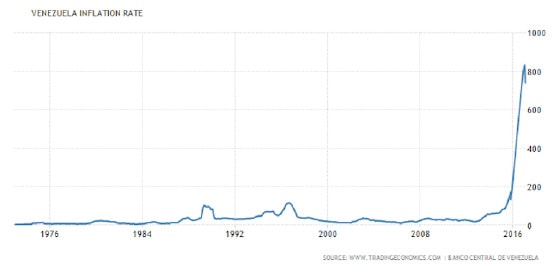
Image source: https://www.moneymetals.com/uploads/content/venezuela-inflation-rate.jpg
Economists have been warning us about this disaster for years, and their warnings have gone largely unheeded. In the meantime, our monetary base has nearly doubled, our national debt is at $13 TRILLION and climbing, and the jobless rate hovers at nearly 15 million, and nothing much is happening to significantly reduce it.
You don't have to look very far, (or very far back) to see what happens when a country's monetary base is devalued to the point of hyper-inflation. The currency turns into wallpaper, and the grocery store shelves get empty. That's when the looting and riots begin. We all saw what happened in Greece when their economy crashed, and when it happens here, in the perennial "land of plenty", it'll make the Athens riots look like a day at Disneyland.
But I didn't write this article to be a harbinger of doom and gloom. I wrote this article to share a simple tip that everyone should know to help weather this economic free-fall, and make sure that you and your family are well prepared for the difficult days to come.
There are several important steps that should be taken to prepare, but one of the most vital things to do to get ready for the coming depression is to start storing food.
If stock-piling food sounds like some paranoid, crack-pot idea to you, think of it as an investment. A personal food-bank that you can draw on whenever you need a little extra. You've probably noticed how much food prices have gone up in just the last year alone, and they're certain to keep going up. It's just a smart idea to store up now before costs get much higher.
Learn how to can and preserve meats, fruits and vegetables at home. It's easy, cheap, and the foods you can at home will be of higher quality and nutritional value than commercially canned foods. Most of our grandparents, or great-grandparents used to can foods and keep a supply of preserved and dry foods in the pantry, or basement. Not because they were kooks, or because it was fashionable, but because they lived through the last depression, and they knew that just because there may be plenty now, that doesn't mean it's always going to be that way.
Buy dried and dehydrated foods like rice, potato flakes, dried beans, peas, flour, etc. They have a shelf-life approaching forever, and if you have a membership at one of the wholesale clubs like BJ's, or Costco, you can buy these items in bulk real cheap.
It doesn't have to be a financial burden, either. Don't try to stock-pile a year's supply of food all at once. That would put a strain on anyone's budget. This should be a process that you do in stages. Start off by just buying a little extra durable staple items each time you do your shopping. If you usually buy 2 boxes of spaghetti, buy 4. Or if you usually get 3 cans of tuna, buy 6. Eventually, you'll have an extra week's worth of food, then a month, then 3 months, etc. Just keep at it.
Even if the economy doesn't go into a terminal tail-spin, keeping a 6-12 month food bank in rotation will give you one less thing to worry about should you get laid off, or suffer some other unforeseen financial crisis.


